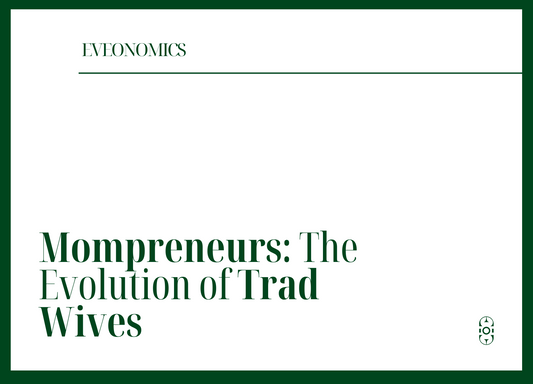In today’s rapidly changing world, we find ourselves at a crossroads where women are reimagining the roles they play in their homes, families, and societies. One of the most intriguing trends that has emerged in recent years is the "trad wife" movement—women who choose to embrace traditional, often conservative roles within their marriages and households. But what does this movement mean in a world where gender roles are constantly shifting? Is it a step backwards or forwards for women’s empowerment? The truth is, it’s far more nuanced than it may appear.
What Is a "Trad Wife"?
At its core, a “trad wife” is a woman who adopts traditional roles, particularly focused on homemaking, child-rearing, and supporting her husband. It’s a role that has deep historical roots, but in the modern context, it’s not about a forced return to old norms. Instead, it’s about choice. Some women choose this role as a response to modern pressures—juggling career demands, financial responsibilities, and societal expectations. For others, it’s a deeper, more personal decision, shaped by cultural values, faith, or a belief in the importance of family life. Understanding this, it becomes clear that the trad wife movement isn’t a singular phenomenon; it’s as diverse as the women who embrace it.
Where It All Began
The idea of women as the central figures in the home is, of course, nothing new. In fact, it’s a role that’s been ingrained in society for centuries. In the 19th and early 20th centuries, the traditional role of women was largely defined by domestic responsibilities. Women were expected to take care of the home and children, while their husbands provided for the family. During the post-WWII era, this domestic ideal became widely popularised, particularly through media and advertising, where the image of the perfect housewife was portrayed as the epitome of success for women.
But as society evolved, so too did the expectations placed on women. The women’s rights movement, especially the second wave of feminism in the 1960s and 1970s, challenged these norms and fought for women to have the freedom to choose their roles—whether that was within the home, the workplace, or elsewhere. The feminist movement made it clear that women could—and should—be empowered to pursue their own ambitions, breaking free from the confines of prescribed roles.
A Return to Traditional Roles?
In recent years, however, there’s been a resurgence in women embracing the "trad wife" lifestyle. Some are calling it a return to traditional values; others see it as a radical choice to reject the expectations that have defined modern womanhood. But what’s driving this new wave?
For many women, becoming a trad wife is about reclaiming control in a world that feels increasingly chaotic and disconnected. In a society that emphasises hyper-individualism and financial independence as markers of success, these women are choosing a different path. They are opting for a role that allows them to focus on the home, the family, and their marriage. For some, this choice offers a sense of purpose and peace, where they can nurture and support their loved ones in a way that feels personally fulfilling.
Social media has played a significant role in amplifying this movement. Platforms like Instagram and TikTok have given women a space to share their experiences, connect with others, and showcase the lifestyle. Influencers and content creators, many of whom are proud trad wives, present their homes as havens of peace, stability, and love. This new wave is not about passivity—it’s about active choice. These women are crafting a lifestyle that aligns with their values and rejecting the modern narrative that says a woman’s worth is determined by her career or financial independence.
Notable figures such as Nara Smith have become influential in pushing the trad wife phenomenon. Nara Smith, a prominent voice on social media, has openly discussed her choice to embrace traditional roles, sharing insights about homemaking, faith, and marriage. She has gathered a significant following of women who resonate with her belief in the power of traditional family structures. In addition to Nara, figures like Emily Wilson and The Traditional Wife (a popular YouTube channel) have also played significant roles in this resurgence. These women, along with many others, have used platforms to encourage other women to adopt or reconsider traditional roles, highlighting the personal empowerment they feel in embracing this lifestyle.
The Heart of the Trad Wife Movement
A key factor driving the trad wife movement is faith. For many women, this lifestyle is deeply tied to their religious beliefs. Whether it’s Christianity, Islam, or other faiths, the traditional role of the wife is often seen as a divine calling to nurture the family, raise children, and support the husband. It’s a role that some women believe is sacred and fulfilling, not just culturally or socially, but spiritually.
Additionally, cultural influences cannot be overlooked. In many communities, the role of women as caregivers, homemakers, and supporters of their husbands is deeply rooted in tradition. These cultural values shape the way women view their roles within the family, often seeing it as an expression of respect for family heritage and societal structure. For some women, becoming a trad wife is a way to connect with their cultural identity and embrace a lifestyle that has been passed down through generations.
Is This a Step Backwards?
The trad wife movement has not been without its critics, and some concerns are more pressing than others. One major criticism is the performative nature of the lifestyle that many influencers present online. While there’s no doubt that many women who embrace the trad wife role are genuinely passionate about it, there is a growing sense that some of the most visible examples are crafting a fantasy rather than reflecting a true, everyday reality. These influencers often showcase a polished, idealised version of life as a trad wife—carefully curated homes, picture-perfect families, and seemingly effortless days. The truth, however, is that many of these women are monetising their lifestyles by showcasing them for social media audiences. In essence, they’re getting paid to present an aspirational, almost fairy-tale version of this traditional life, which doesn’t always reflect the real struggles or compromises that come with it.
This performative aspect of the trad wife phenomenon can be seen as part of a larger trend where social media often blurs the line between reality and fantasy, selling an unattainable image of “the good life.” It raises important questions about the commodification of a lifestyle that claims to be about authenticity and personal fulfilment. The reality of the work involved in homemaking and child-rearing, often in the context of a traditional marriage, is far more complex than what’s portrayed in influencer videos and photos.
Additionally, a major flaw in the trad wife movement lies in its economic accessibility. The concept of a "trad wife" lifestyle is, for many, a luxury. In today’s world, most families require dual incomes simply to meet their basic needs. The pressures of rising living costs, housing, healthcare, and education have made it nearly impossible for many women to stay at home full-time, let alone embrace a traditional domestic role. For most women, especially those from lower- and middle-income households, being a trad wife is a privilege that they cannot afford. The financial pressure to contribute to the household income in some form is an inescapable reality.
The idea that women can simply choose to step back from professional careers or contribute solely to homemaking is a luxury that is not available to everyone. This highlights a critical point in the criticism of the trad wife movement: the lifestyle is framed as a choice but is often presented as something that’s universally accessible, which is far from the truth. The pressures of modern economic realities make the "stay-at-home wife" ideal an unattainable dream for many women.
Trad Wives in the 21st Century
While the traditional roles embraced by many trad wives may seem old-fashioned to some, it’s important to note that today’s trad wife isn’t necessarily stuck in the past. Many women who identify as trad wives have adapted the lifestyle to fit modern realities. They often balance their homemaking duties with entrepreneurial ventures, creating online businesses, writing blogs, or offering services like coaching or consulting. For these women, the role of the trad wife is not about submission but about finding balance between their responsibilities at home and their personal ambitions.
What we’re seeing is not a rejection of modernity, but rather a reimagining of what it means to live a fulfilling life. Trad wives today may still embrace the importance of family life, but they’re also finding ways to contribute to society and pursue their own passions. Their lives are complex and multi-faceted, much like the lives of their non-traditional counterparts.
The Intersectionality of the Trad Wife Movement
As with any movement, the trad wife lifestyle is not monolithic. The choices made by women within this movement are shaped by a variety of factors, including race, class, and socioeconomic status. For some, the ability to stay home and focus on domestic responsibilities is a privilege, not a universal option. Women from different backgrounds may experience the trad wife role in very different ways, based on their economic standing, cultural expectations, and access to resources.
Moreover, the movement’s appeal may be seen differently across cultures. In Western societies, it might be viewed as a form of rebellion against modern feminism, while in other parts of the world, it aligns more closely with long-standing cultural and religious values. Understanding these differences is key to understanding why some women gravitate toward the trad wife lifestyle and why others may reject it entirely.
Choice and Empowerment: The Importance of Agency
At its heart, the trad wife movement is about choice. It’s about women deciding how they want to define their roles in life, in marriage, and in society. For many, choosing to stay at home and support their families is not a step backwards but a conscious decision to live in a way that feels authentic to them. They are reclaiming their agency and rejecting the societal pressures that tell them their value lies in external achievements rather than in their ability to nurture and care for their loved ones.
In a world where women’s roles are constantly evolving, the choice to be a trad wife is a reminder that empowerment comes from the freedom to choose one’s path. Whether that path involves homemaking, career-building, or a combination of both, the important thing is that the choice is theirs to make.
Public Perception and the Debate on Gender Roles
The media often portrays the trad wife movement in contrasting ways. For some, it’s a refreshing return to a time when family values were at the centre of society. For others, it’s seen as a step backwards, reinforcing outdated gender norms. The public debate surrounding the movement reflects the wider conversation about gender roles, women’s rights, and societal expectations.
What’s clear is that the trad wife movement is a focal point for broader discussions on gender, empowerment, and the choices women make in shaping their lives. It’s a complex issue with no easy answers, and it continues to challenge us to think about what it means to be truly empowered in today’s world.
A Complex Choice in a Complex World
The new wave of trad wives is an invitation to reconsider the way we think about women’s roles. It’s not a simple story of regression or progress; it’s a nuanced conversation about choice, agency, and the diverse ways women navigate the world. Whether women are embracing traditional roles because of faith, culture, or personal conviction, the important thing is that they are making those choices freely.
As we continue to redefine what it means to be empowered, we must recognise that women’s paths are varied and unique. The trad wife movement is just one example of how women are taking charge of their own destinies. In a world that often pressures women to conform to specific expectations, the ability to choose one’s role—whether that’s traditional or modern—is, in itself, a powerful act of self-definition.





